#foucault's pendulum
Explore tagged Tumblr posts
Text
my dealer: got some straight gas 🔥😛 this strain is called "the plan" 😳 you'll be zonked out of your gourd 💯
me: yeah whatever. i don't feel shit.
12 years later: dude i swear the templars are after me
my buddy casaubon, pacing: the eiffel tower is lying to us
#love this format. gets me everytime#foucault's pendulum#il pendolo di foucault#umberto eco#book memes
60 notes
·
View notes
Text
FILENAME: Pinball
You don't play pinball with just your hands, you play it with the groin too. The pinball problem is not to stop the ball before it's swallowed by the mouth at the bottom, or to kick it back to midfield like a halfback. The problem is to make it stay up where the lighted targets are more numerous and have it bounce from one to another, wanderings, confused, delirious, but still a free agent. And you achieve this not by jolting the ball but by transmitting vibrations to the case, the frame, but gently, so the machine won't catch on and say Tilt. You can only do it with the groin, or with a play of the hips that makes the groin not so much bump, as slither, keeping you on this side of an orgasm. And if the hips move according to nature, it's the buttocks that supply the forward thrust, but gracefully, so that when the thrust reaches the pelvic area, it is softened, as in homeopathy, where the more you shake a solution and the more the drug dissolves in the water added gradually, until the drug has almost entirely disappeared, the more medically effective and potent it is. Thus from the groin an infinitesimal pulse is transmitted to the case, and the machine obeys, the ball moves against nature, against inertia, against gravity, against the laws of dynamics, and against the cleverness of its constructor, who wanted it disobedient. The ball is intoxicated with vis movendi, remaining in play for memorable and immemorial lengths of time. But a female groin is required, one that interposes no spongy body between the ileum and the machine, and there must be no erectile matter in between, only skin, nerves, padded bone sheathed in a pair of jeans, and a sublimated erotic fury, a sly frigidity, a disinterested adaptability to the partner's response, a taste for arousing desire without suffering the excess of one's own: the Amazon must drive the pinball crazy and savor the thought that she will then abandon it.
- Foucault's Pendulum, Umberto Eco
7 notes
·
View notes
Text
Me, dropping a bagel: Ah, this too must be The Plan.
#foucault's pendulum#live reading#everything is The Plan obviously#the untold plot that links the disparate together#I say this shit every time now send fucking help#this post is also the Plan
5 notes
·
View notes
Text


I have been so intimidated by this while it's been sitting on my shelves for the past few months that I've decided to just jump in and see what happens. I found the first few pages confusing at first - I think because I had convinced myself that this book was too challenging for me to ever understand. But I reread those pages and a few more, and I'm enjoying it already.
When I was younger I used to read books and enjoy them despite some things going over my head. I didn't really worry about whether they were too smart for me, I would just do a bit of research here and there and enjoy myself. I think I've lost some of that confidence, but I hope I get back to reading in that way.
-
I was also reading a review of the novel, and it included this excellent statement from the author:
Does Eco expect his readers to bring a preexisting body of knowledge to his fiction, or does he expect them to have to work at the books? "There is no contradiction," he says. "Reading is a cooperative action in which the reader is supposed to fill up a lot of empty space. You write, and you want the reader to add a little more. The reader must collaborate. To communicate doesn't mean to tell everything. It means to cooperate in making the book grow." (Source here)
42 notes
·
View notes
Text
youtube
The air has grown chilly, the leaves have turned, and summer morphs into autumn.
And so we celebrate fall. (Get it? Fall.)
(Daft Punk's video of 'All Around the World," directed by Michel Gondry, is of this performance carried out around the famous Foucault pendulum, located at the highest point of the dome of the Pantheon.)
#Youtube#Yoann Bourgeois#La mécanique de l'histoire#Le Panthéon Paris#Daft Punk#Michel Gondry#Foucault's pendulum#Pantheon#All Around the World
2 notes
·
View notes
Text
Foucault's Pendulum is a novel by Umberto Eco, most famous for his excellent novel The Name of the Rose and for his essay Ur-Fascism. I liked it, though I would certainly recommend The Name of the Rose (and possibly The Prague Cemetery, though that one's more a matter of what you're interested in) over it.
I do not think I am spoiling anything when I say that the novel is an exploration of the natural observation a rational person immediately makes when encountering occultist or conspiracy theorist thought. "I could come up with a much more convincing theory than that." These people have extremely low epistemic standards, tend to be basically ignorant about history, and have no sense of chronology. Consequently, it seems trivial to identify spurious connections the way they do and weave them consciously according to the obvious narrative structures that support their beliefs. Now, I don't believe actually doing this is quite as easy as it looks, but it's a tempting notion. I've got one on the back burner revolving around the Ford Motor Company Sociology Department.
The novel makes other observations about occultist/conspiracy theorist thought. The tendency to interpret anachronism as prophecy, the intellectuals who believe under a pose of neutrality, the economics of it, how strange it seems that so many leading men of the Enlightenment were into it, the curious politics and anti-politics of conspiracy theorism. Some of these are handled through digressions, some are integrated into the plot, both are inoffensive to the structure.
The novel is well-executed, though Eco does love to get fancy with it. How willing you are to indulge his references, quotations, layers of narrative and nonlinear timeline will significantly determine whether you enjoy the book, but I don't think the book is really as difficult as I've seen critics suggest. You just need to decide that in-jokes and references you didn't get probably weren't that important, and the details of the plot don't really matter. I've also seen the book described as postmodern. A tempting designation given that Umberto Eco was very literally a postmodernist, but quite frankly by the standards people apply to justify the "postmodern" label you could probably make that case for the Epic of Gilgamesh as well so I don't think that's very meaningful.
9 notes
·
View notes
Text


I believe that what we become depends on what our fathers teach us at odd moments, when they aren't trying to teach us. We are formed by little scraps of wisdom. When I was ten, I asked my parents to subscribe to a weekly magazine that was publishing comic-strip versions of the great classics of literature. My father, not because he was stingy, but because he was suspicious of comic strips, tried to beg off. “The purpose of this magazine,” I pontificated, quoting the ad, “is to educate the reader in an entertaining way.” “The purpose of your magazine,” my father replied without looking up from his paper, “is the purpose of every magazine: to sell as many copies as it can.”
That day, I began to be incredulous.
Or, rather, I regretted having been credulous. I regretted having allowed myself to be borne away by a passion of the mind. Such is credulity. Not that the incredulous person doesn't believe in anything. It's just that he doesn't believe in everything. Or he believes in one thing at a time. He believes a second thing only if it somehow follows from the first thing. He is nearsighted and methodical, avoiding wide horizons. If two things don't fit, but you believe both of them, thinking that somewhere, hidden, there must be a third thing that connects them, that's credulity.
Incredulity doesn't kill curiosity; it encourages it. Though distrustful of logical chains of ideas, I loved the polyphony of ideas. As long as you don't believe in them, the collision of two ideas— both false—can create a pleasing interval, a kind of diabolus in musica. I had no respect for some ideas people were willing to stake their lives on, but two or three ideas that I did not respect might still make a nice melody. Or have a good beat, and if it was jazz, all the better.
—Umberto Eco, Foucault's Pendulum (1988)
[Robert Scott Horton]
9 notes
·
View notes
Quote
You must not think linearly... Nature doesn't; nature knows nothing of time. Time is an invention of the West.
Umberto Eco, Foucault's Pendulum
223 notes
·
View notes
Text
THIS is the guy the wrote the principles of Ur-Fascism??


#umberto eco#Foucault's pendulum#I have zero contact for this scene#my gf is reading this#and she won't shut up about the plan
0 notes
Text
"What do they do?"
"The usual unspeakable things. Men and women hold in the palm of their hand, and raise to heaven, their own ignominy, namely, sperm or menstruum, then eat it, calling it the Body of Christ. And if by chance a woman is made pregnant, at the opportune moment they stick a hand into her womb, pull out the embryo, throw it into a mortar, mix in some honey and pepper, and gobble it up."
"How revolting, honey and pepper!" Diotallevi said.
- Foucault's Pendulum, Umberto Eco
2 notes
·
View notes
Text
Why does this remind me of Eco's Foucault's Pendulum?
Small town murder mystery where it eventually turns out that literally everyone in town is a member of some secret society or sinister cult – except it's not one big secret society, it's a bunch of little ones, ranging from as many as a couple dozen members to as few as three. Each secret society is aware of their own immediate allies and rivals, but none of them have the complete picture of how extensive the town's secret society problem is, nor do they know that every single resident is a member of at least one. Some residents are members of multiple secret societies. Some residents are unwittingly members of multiple secret societies, having mistakenly concluded that Secret Society A is Secret Society B's hidden inner circle, when in fact they're unrelated. There's at least one pair of secret societies whose leaders each believe that the other is a false front that they set up to distract their enemies. This goes on for five seasons.
#concepts#media#television#tropes#murder mysteries#conspiracies#death mention#violence mention#Umberto Eco#Foucault's Pendulum
15K notes
·
View notes
Text
Agliè: "You need to know there's a secret or else there wouldn't be a point to life would there? Everything would only be as it is with no point."
Me, who has been reading this book trying to find out what The Plan is: Hey wait a minute.
#foucault's pendulum#umberto eco#live reading#I'm never going to learn what this fucking plan is because it's the only impetus of the story#without which it will fall apart and become meaningless words about a mundane life#The Plan is just a shadow of meaningful plot forever tantalizing me forward#fucking brilliant
2 notes
·
View notes
Text
Cosmas Megalommatis, Is History Secret?
(Book review of Umberto Eco's book, Foucault's Pendulum); DIAVAZO, fasc. 235 (March 21, 1990), pp. 113-128
Η Ιστορία Μυστική; (Βιβλιοκρισία του βιβλίου του Ουμπέρτο Έκο, Το Εκκρεμές του Φουκώ); Διαβάζω, τεύχος 235 (21 Μαρτίου 1990), σελ. 113-128

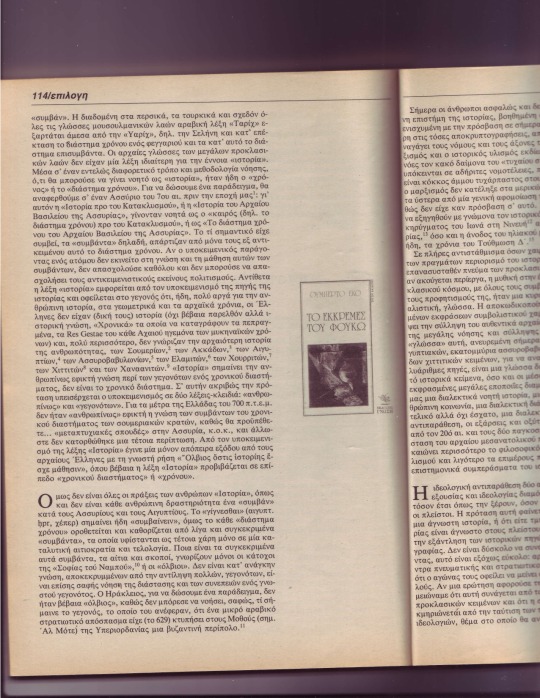


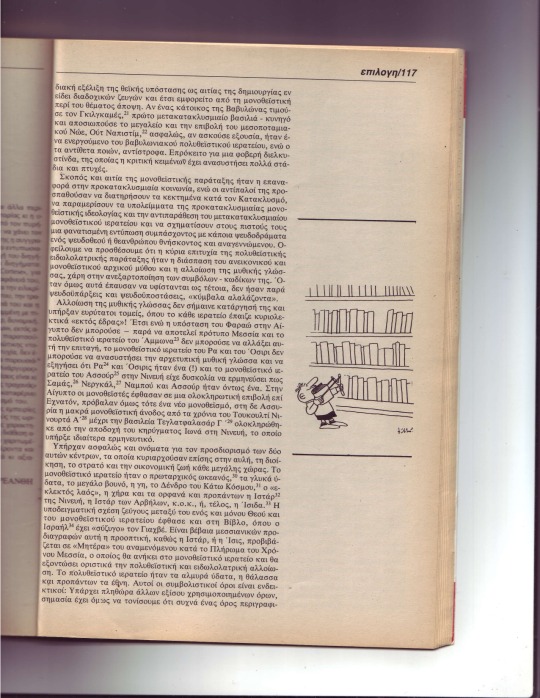
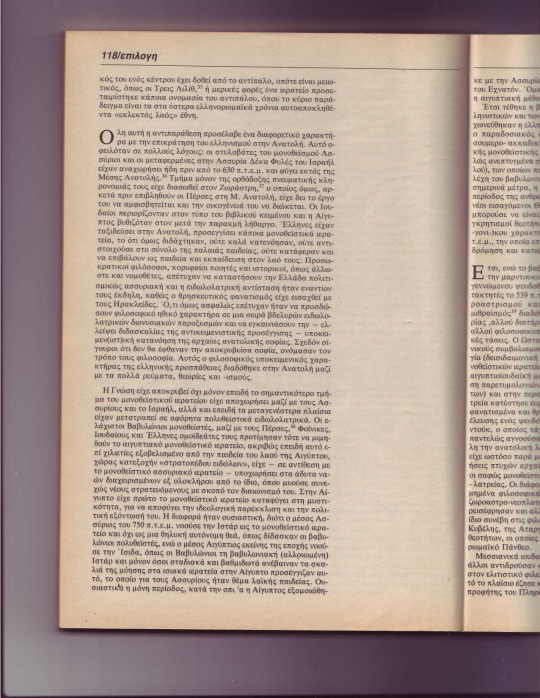
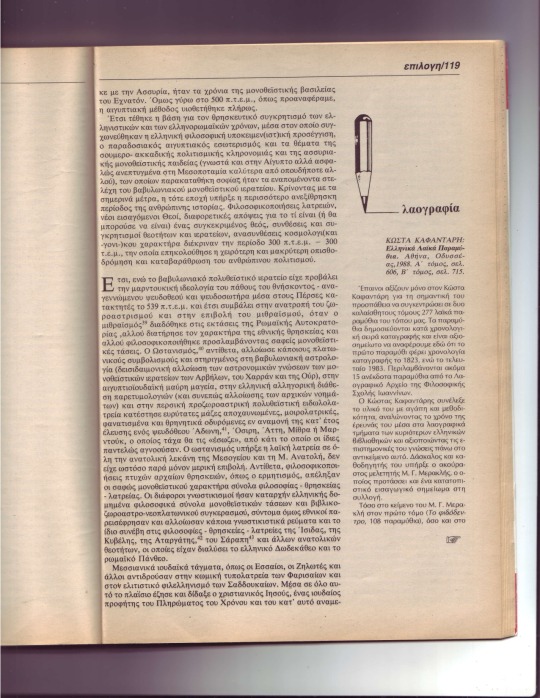
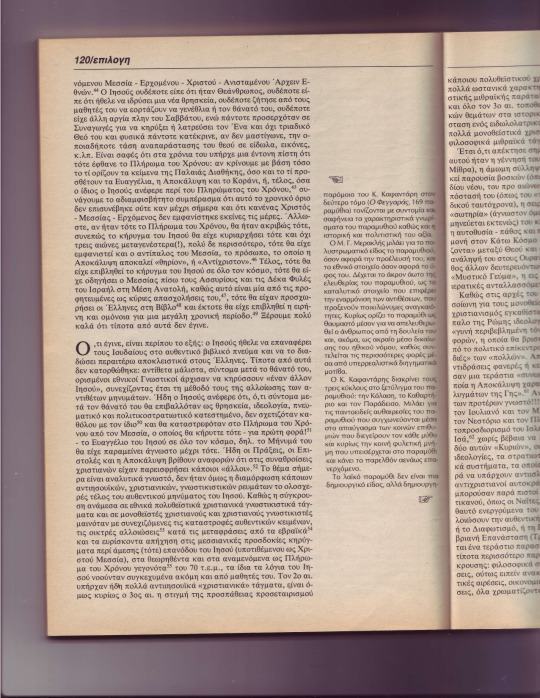

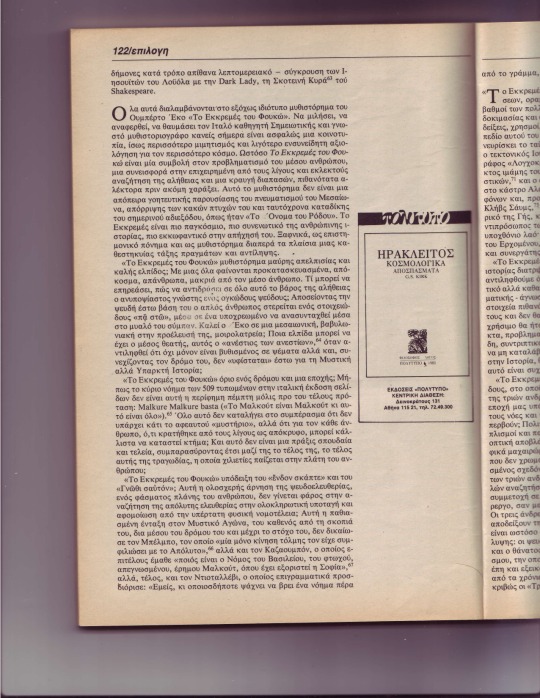
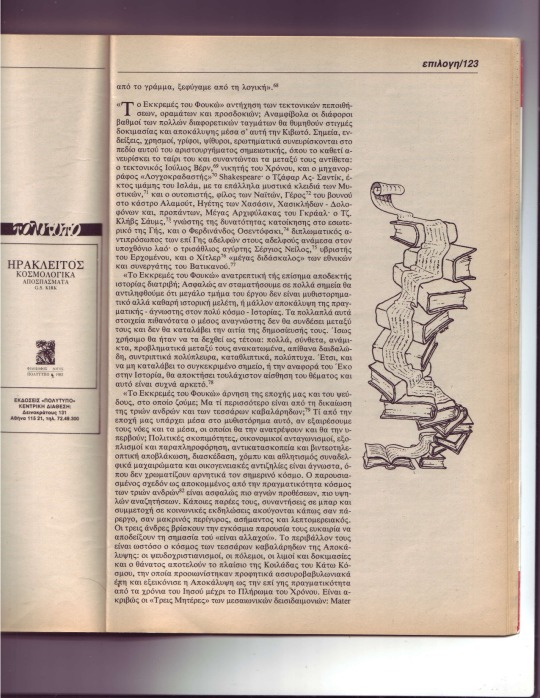
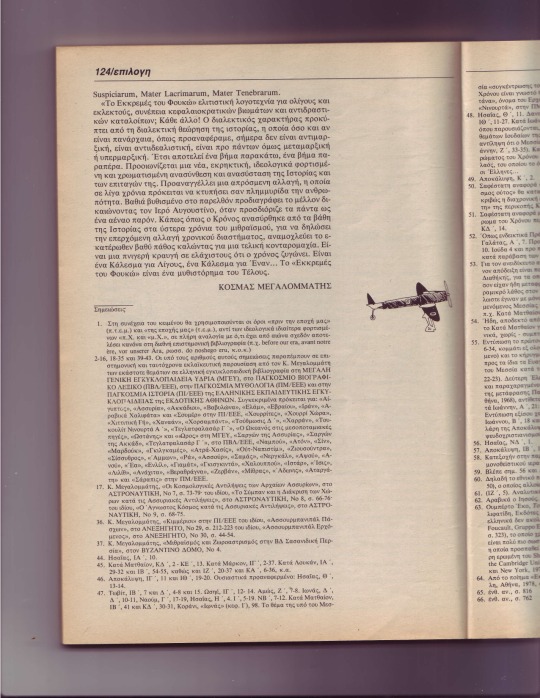
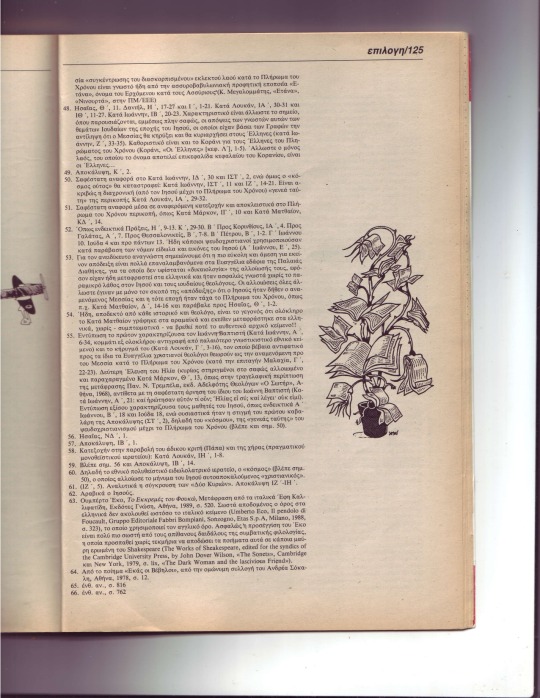
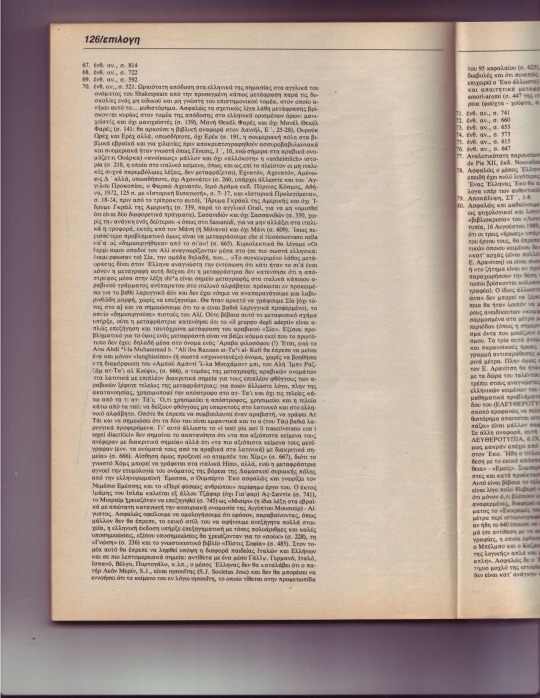
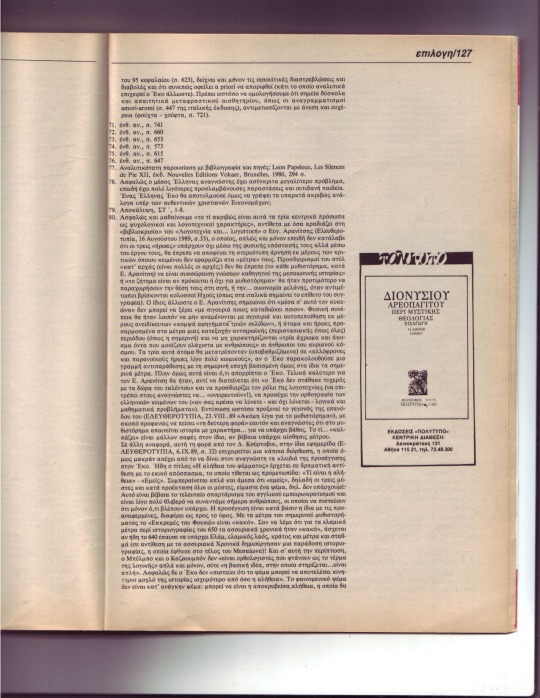
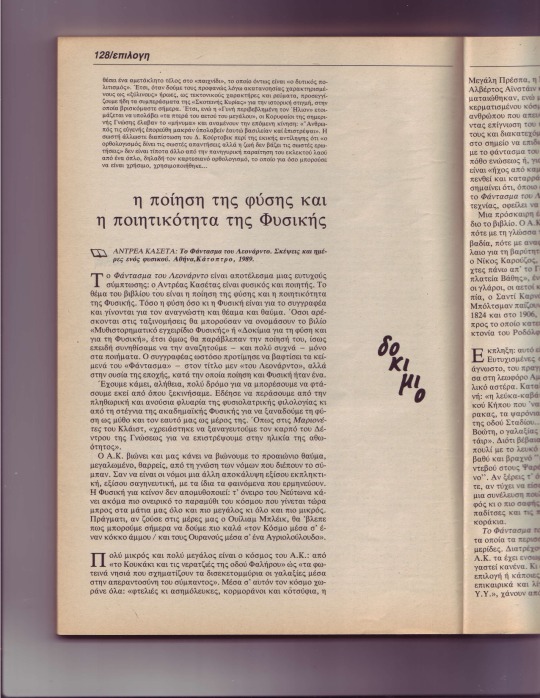
Download the book review in PDF:
https://www.slideshare.net/MuhammadShamsaddinMe/ss-9cf1 https://figshare.com/articles/journal_contribution/_b___b_/24720432
#Umberto Eco#Il Pendolo di Foucault#Foucault's Pendulum#Megalommatis#Kabbalah#mysticism#esotericism#Τ�� Εκκρεμές του Φουκώ#Ουμπέρτο Έκο#Μεγαλομμάτης#μυστικισμός#εσωτερισμός#Καμπαλά
1 note
·
View note
Text
I used to name my computers, since my very first, but I can't be bothered anymore. It's not a funny game anymore
My first computer was Ahasverus, like th main character's in Foulcault's Pendulum.
And I want to hear those names if you’re willing to share I’ll go first my cello is named Scarlet my violin is named Four
17K notes
·
View notes
Text
me reading and watching literally anything: how can i make a passionate torrid intricate Levi au out of this 🤔
#AS IF I ALREADY DONT HAVE ENOUGH 😶🌫️😶🌫️😶🌫️#was reading foucaults pendulum the other day and i caught myself thinking how could i incorporate a sexy love story into this LMAO#nothing is safe im afraid#levi ackerman#levi ackerman x reader#levi x reader#attack on titan#shingeki no kyojin#aot#snk#aphroditaeon.txt
20 notes
·
View notes
